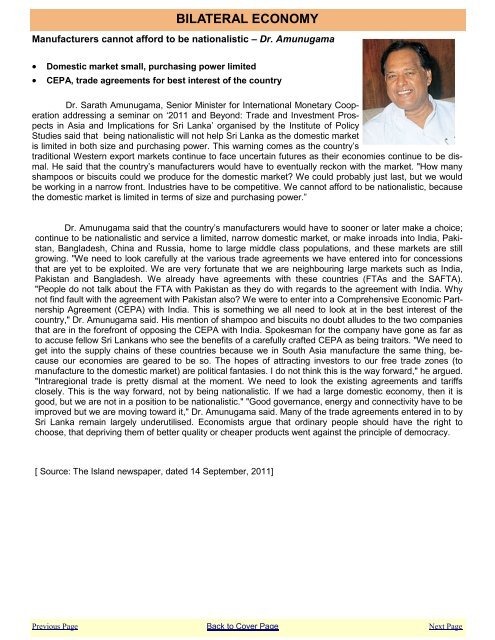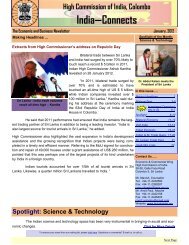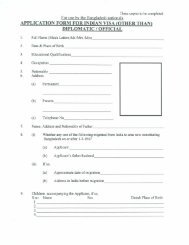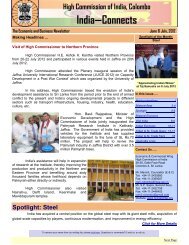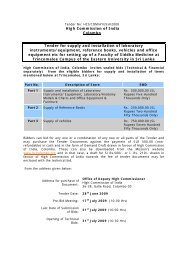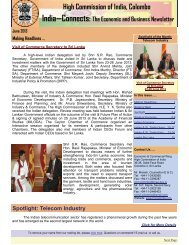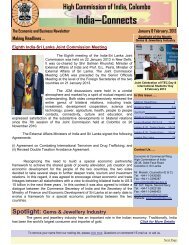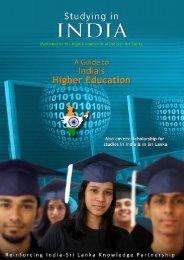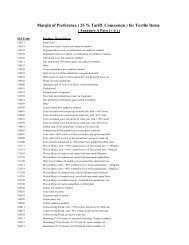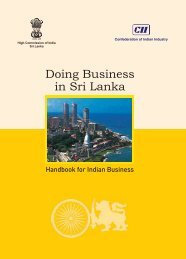IndiaâConnects - High Commission of India, Colombo
IndiaâConnects - High Commission of India, Colombo
IndiaâConnects - High Commission of India, Colombo
You also want an ePaper? Increase the reach of your titles
YUMPU automatically turns print PDFs into web optimized ePapers that Google loves.
BILATERAL ECONOMYManufacturers cannot afford to be nationalistic – Dr. AmunugamaDomestic market small, purchasing power limitedCEPA, trade agreements for best interest <strong>of</strong> the countryDr. Sarath Amunugama, Senior Minister for International Monetary Cooperationaddressing a seminar on „2011 and Beyond: Trade and Investment Prospectsin Asia and Implications for Sri Lanka‟ organised by the Institute <strong>of</strong> PolicyStudies said that being nationalistic will not help Sri Lanka as the domestic marketis limited in both size and purchasing power. This warning comes as the country‟straditional Western export markets continue to face uncertain futures as their economies continue to be dismal.He said that the country‟s manufacturers would have to eventually reckon with the market. "How manyshampoos or biscuits could we produce for the domestic market? We could probably just last, but we wouldbe working in a narrow front. Industries have to be competitive. We cannot afford to be nationalistic, becausethe domestic market is limited in terms <strong>of</strong> size and purchasing power.”Dr. Amunugama said that the country‟s manufacturers would have to sooner or later make a choice;continue to be nationalistic and service a limited, narrow domestic market, or make inroads into <strong>India</strong>, Pakistan,Bangladesh, China and Russia, home to large middle class populations, and these markets are stillgrowing. "We need to look carefully at the various trade agreements we have entered into for concessionsthat are yet to be exploited. We are very fortunate that we are neighbouring large markets such as <strong>India</strong>,Pakistan and Bangladesh. We already have agreements with these countries (FTAs and the SAFTA)."People do not talk about the FTA with Pakistan as they do with regards to the agreement with <strong>India</strong>. Whynot find fault with the agreement with Pakistan also? We were to enter into a Comprehensive Economic PartnershipAgreement (CEPA) with <strong>India</strong>. This is something we all need to look at in the best interest <strong>of</strong> thecountry," Dr. Amunugama said. His mention <strong>of</strong> shampoo and biscuits no doubt alludes to the two companiesthat are in the forefront <strong>of</strong> opposing the CEPA with <strong>India</strong>. Spokesman for the company have gone as far asto accuse fellow Sri Lankans who see the benefits <strong>of</strong> a carefully crafted CEPA as being traitors. "We need toget into the supply chains <strong>of</strong> these countries because we in South Asia manufacture the same thing, becauseour economies are geared to be so. The hopes <strong>of</strong> attracting investors to our free trade zones (tomanufacture to the domestic market) are political fantasies. I do not think this is the way forward," he argued."Intraregional trade is pretty dismal at the moment. We need to look the existing agreements and tariffsclosely. This is the way forward, not by being nationalistic. If we had a large domestic economy, then it isgood, but we are not in a position to be nationalistic." "Good governance, energy and connectivity have to beimproved but we are moving toward it," Dr. Amunugama said. Many <strong>of</strong> the trade agreements entered in to bySri Lanka remain largely underutilised. Economists argue that ordinary people should have the right tochoose, that depriving them <strong>of</strong> better quality or cheaper products went against the principle <strong>of</strong> democracy.[ Source: The Island newspaper, dated 14 September, 2011]Previous Page Back to Cover Page Next Page


